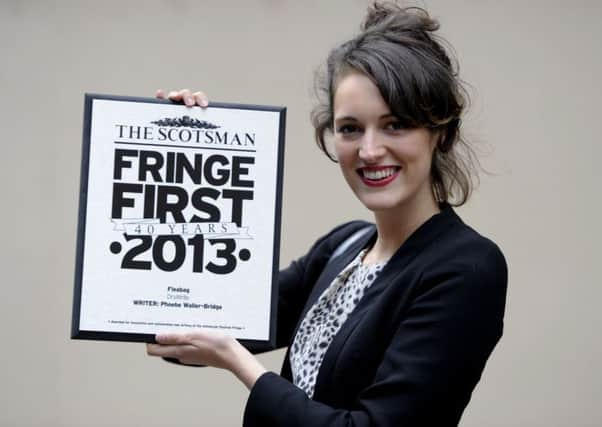Edinburgh Fringe needs to shout about its many success stories – Brian Ferguson


It is not often that I find my heart skipping a beat scrolling through Twitter of a morning.
But I had to replay Phoebe Waller-Bridge’s Emmy acceptance speech after Fleabag was named best comedy series to prove I wasn’t still in dreamland. Did she really give a shout out to the Edinburgh Festival Fringe as she recalled the “absolutely mental” journey her character has been on over the last five years? She certainly did and, after record levels of complaining about the Fringe recently, it was a timely reminder that Fleabag began as a one-woman show performed in the Cowgate. Three years on from the TV adaptation’s launch, and a few days after the end of the original stage triumphant final run in London’s West End, Fleabag was the toast of the Emmys, competing with Game of Thrones for the headlines in Hollywood. And this newspaper can perhaps take a small part of the credit for Fleabag’s success. After all, its first major honour was a Scotsman Fringe First Award. It was worth dipping into our online archive to be reminded of our critic Matt Trueman’s five-star review of Waller-Bridge’s debut play. He wrote: “Fleabag is a daring debut that makes up its own rules. I’ve never seen a play quite like it.” Now, a cynic may suggest that Fleabag is something of a one-off for the Fringe, a once-in-a-generation hit that has gone on to become an entertainment phenomenon.
Yet it is remarkable how many cultural touch-stones and world-leading performers can trace their roots back to the event – even though such links can be hard to pin down, or are little-known. I almost fell off my seat watching the Graham Norton Show last year when Lin-Manuel Miranda, the creator of the all-conquering musical Hamilton, started recalling his days as an unknown performer at the Fringe.
It was a surprise to me that he performed at the Assembly Rooms with the hip hop comedy troupe, Freestyle Love Supreme, he still performs with, who were described as “a bunch of fresh-faced, quick-witted New York kids who improvise rap tunes to audience suggestion”.
Their one and only Fringe appearance in 2005 was somewhat overshadowed by the breakthrough debut, at the Gilded Balloon’s Teviot Row headquarters, of Tim Minchin, the Australian comic, musician and singer, who went on to similar levels of world domination with his Matilda musical. He followed in the Fringe footsteps of New Zealand comedy duo Flight of the Conchords, whose show at The Caves saw them nominated for the then Perrier Award, which paved the way for them to be snapped up by entertainment giants HBO. It is nearly 20 years since a then unknown Eddie Redmayne appeared in Underbelly’s Cowgate home, in a production of Cabaret. The actor himself has recalled how “the “grotty, grimy venue” was where he “really got the bug” for acting
The further you go back the more the realisation dawns that a world without the Fringe would be one without Monty Python, Fawlty Towers, Blackadder and Alan Partridge. It can be argued that Billy Connolly would not have made it big if he had not brought a show in 1972. And would John Byrne have gone on to write The Slab Boys and Tutti Frutti had he not had a Fringe hit with Writer’s Cramp in 1977?
It is clear that culture has been, and continues to be, Edinburgh’s calling card to the rest of the world. But just as its remarkable literary history was a closely-kept secret until it was officially recognised by Unesco, perhaps the Fringe’s contribution has been under-sold, even after more than 70 years? And could the way to address this after such a long be the creation of an official archive to properly chart its evolution, to help inspire future generations of performers, but also ensure the Fringe is able to evolve and thrive?